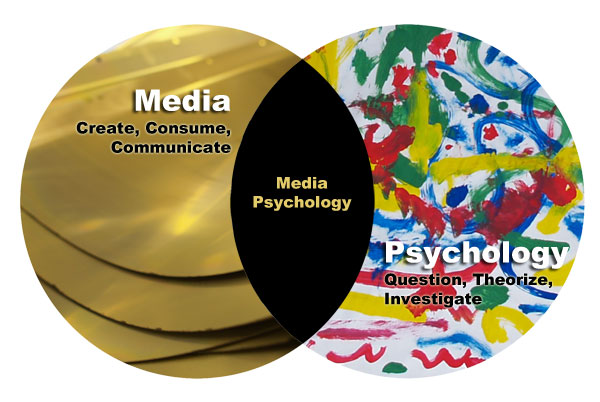In 2008 I wrote Understanding Media Psychology for the APS Observer. This is an update of that, touching on the questions:
- What is media psychology?
- What do media psychologists do?
- Where is media psychology headed?
Media Psychology Is
A scientific way of exploring our interactions with and through media. It looks at behavioral, developmental, social, and biological interactions between individuals and groups with media.
What Media Psychologists Do
Some of us are teachers, some consultants, some researchers. We are all curious. We all have a passion for finding answers…and sometimes more questions.
I’m often asked if media psychology can be used to create propaganda. Yes, you can use it to influence people, to understand how we connect with media and others through media, and to figure out why some campaigns work while others don’t. You can also research how propaganda spreads and use that information to teach people how to recognize and think critically about media messages.
But that’s definitely not the only angle to media psychology. Some media psychologists study how to use media effectively in education, therapy, or government. Some study our emotional reactions and connections with fictional media. Some study how media can influence behavior–not just ads or propaganda, but use of augmented reality or portable devices. For my dissertation I studied how we connect with others through a variety of media to create communities and how we define those communities compared to the traditional community. Before that I studied independent media agendas.
Because we are constantly connected through media, there are uncountable angles to explore how it all affects our lives, society, behavior, relationships … This is only the tip of the iceberg. There are so many interesting topics being explored. I suggest you take a look for yourself at some of them:
- Media Psychology (contents of the most recent journal)
- Media Psychology Review
The Future of Media Psychology
I don’t have a Magic 8 Ball. But I do see growing interest in media psychology as a field of study. When I started at Fielding Graduate University it was an unknown area. Now media psychology is being integrated into communications studies programs and other psychology programs in the USA and abroad (see the APA Division 46 grad programs list). Google News Alerts actually sends messages to me with articles referencing media psychology.
It is not coincidental that we are also experiencing a surge of new media exploration. More and more people are joining the conversation through social media. The USA is leading the way for people aged 55+ interacting in social networks and using mobile devices for social media. With all of these changes come questions. Are these interactions changing us? Do we get the same fulfillment from them as past mediated and non-mediated activities? Can we lead healthy, happy lives in this mediated world?
Those are all questions for another post … but we are in the age of media psychology.
What Media Psychology Means To Me
I was really lucky to have Dr. Karen Dill as my dissertation chair. She believes in cross-discipline research and let me include anthropology, sociology, and communications research as support for my psychology explorations. It’s not typical. All of that was on top of a media psychology foundation, which is already a great convergence of diverse psychology fields and media/communications studies.
I believe media psychology is a field that will help us all navigate the constant changes we experience with the exciting evolution of media. I hope it is a field that encourages research across academic disciplines and draws together researchers with diverse interests.
See my related storify for more links/resources.
